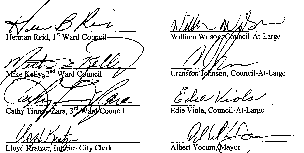
500 Dupont Road Office
Westover, WV 26501
(304) 2966860 - Fax (304) 2966582
January 20, 2004
RESOLUTION REQUESTING UNITED STATES CONGRESS TO AUTHORIZE AND FUND A DEMONSTRATION PROJECT ON THE UPPER MONONGAHELA RIVER IN WEST VIRGINIA FOR REMAL AND DISPOSAL OF RIVER TRASH AND DEBRIS
WHEREAS, flowing river trash and debris, consisting of manmade rubbish and naturallyoccurring wood wastes, deposits on river banks and at riverside facilities, and accumulates behind locks and dams on our nation's navigable rivers, creates many problems, such as:
(1) Visual and odor pollution;
(2) Water pollution, hazardous to humans and aquatic life, from chemicals and hazardous materials in manmade rubbish;
(3) Health and safety hazards, for community and industrial water intakes, swimmers, water skiers, marinas, public and private docks and launching ramps, and recreational boaters and river commerce;
(4) Navigation hazards, for commercial tows and recreational and longrange tourist boaters; and
(5) Interference with and damage to locks and dams;
WHEREAS, no workable and costeffective methodology exists today to deal with the problem of river trash and debris; and
WHEREAS, the U.S. Army Corps of Engineers is charged with the responsibility for our nation's navigable rivers; and
WHEREAS, state and local governments with
navigable rivers within, their purview cannot solve the river
trash and debris problem on their own, but are willing to partner
with the federal government in addressing the river trash and
debris problem;
THEREFORE BE IT RESOLVED, that the Westover City Council:
(1) Requests that the Congress of the United States authorize and fund a
demonstration program to be conducted on the Upper Monongahela River in West Virginia, by the Pittsburgh District of the U.S. Army Corps of Engineers, to develop the methods and technology needed to solve the problem of river trash and debris removal and disposal and to develop a national technology base for addressing the river trash and debris problem on all our nation's navigable rivers;
(2) Stands ready to partner with the federal government in this endeavor; (3) Suggests that the federal role focus on the technology for removing flowing
riverborne debris and debris accumulating at the locks and dams, and that the state and local government entities would focus on means for removing trash from riverbanks, providing transportation and disposal sites for collected river trash and debris, educating the public not to illegally dump trash that subsequently get into streams leading to the river, and problems that clean up illegal dump sites before they contribute to riverborne debris;
(4) Suggests that a threephase approach to solving the river trash and debris
problem be followed:
a. Phase 1 would be for the Corps to prepare a report on historical approaches for dealing with river trash and debris removal and disposal in the United States and worldwide. The report would also address the economic costs to our nation's economy resulting from the river trash and debris problem, and a costbenefit analysis rationale for evaluating solutions to the river trash and debris problem. A first draft of said report would be due six months after congressional authorization for the river trash and debris project. The final report would be due six months later. This phase would also include the development of partnering agreements with state and local government entities, and business, recreational, and environmental entities, within the West Virginia demonstration region. Further, the Corps would establish a steering committee with representation from appropriate entities within the West Virginia demonstration region to advise on project implementation. The steering committee might also include other organizations within the United States that have an interest in the river trash and debris problem and/or who have expertise that bears upon the problem.
b. Phase 2, lasting perhaps one year following
the completion of Phase 1, would develop one or more methods and
technology approaches for dealing with the river trash and debris
problem with recommendations as to the feasibility of each
approach and a recommendation for the best and first approach to
be tried.
c. Phase 3, lasting perhaps five years, would implement and test the favored approach for dealing with river trash and debris removal and disposal.
d. Phase 4, a oneyear effort, would evaluate results to date and propose any further efforts needed to continue to improve on methods and technology for solving the river trash and debris problem.
